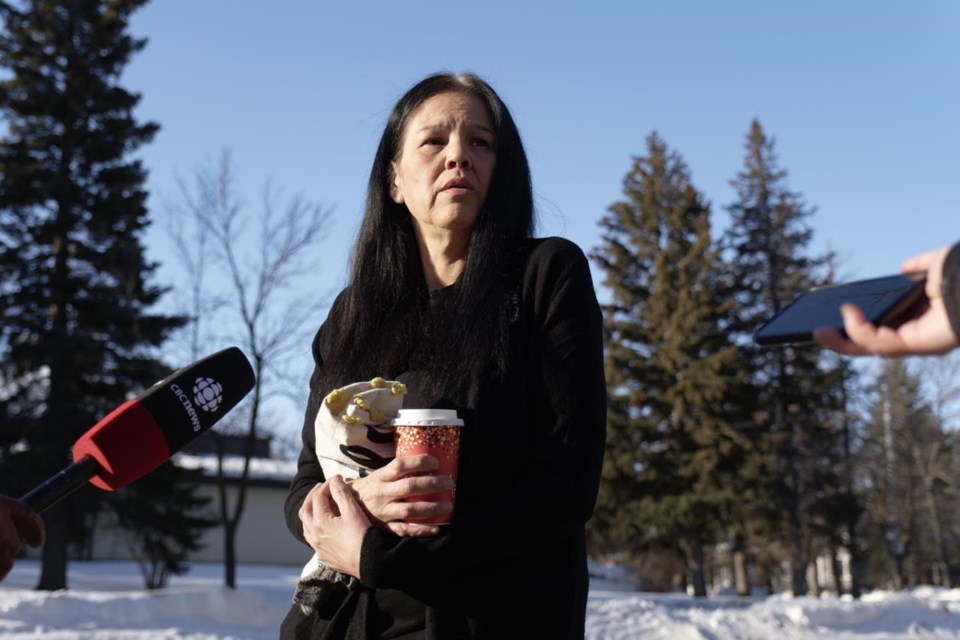YORKTON, Sask. — Two sisters who have spent nearly 30 years in prison for what they say are wrongful murder convictions hugged tightly after a Saskatchewan judge granted them bail.
"I always knew in my heart we’d be free," Odelia Quewezance, 51, said outside Yorkton Court of King's Bench on Monday.
Quewezance and her sister, Nerissa, 48, were convicted of second-degree murder in the 1993 stabbing death of 70-year-old farmer Anthony Dolff near Kamsack, Sask.
The federal Justice Department started a review of their convictions last year, saying there may be a reasonable basis to conclude there was a miscarriage of justice.
Defence lawyers asked for the Indigenous sisters to get a conditional release while the federal review continues.
Justice Donald Layh granted their request, saying the Quewezance sisters raised sufficient "evidentiary matters that make their application of appropriate strength to support their release."
"I wish you the best on your new journey," Layh told the sisters after reading his decision.
The sisters, who were both dressed in traditional ribbon skirts, smiled at each other and looked over to family members sitting in the courtroom as they learned of their impending freedom.
Many members of Dolff’s family left after the decision was announced and Crown prosecutor Kelly Kaip said they were disappointed with the outcome.
"This has been a very difficult ordeal for the family of (Anthony) Dolff," Kaip said outside of court. "It’s been a really difficult 30 years and it’s been a really difficult last few months. “
Kaip had argued that, even if there were issues with the police investigation, there was still enough evidence to show the sisters were involved in the killing. Kaip said she will review the bail decision before deciding next steps.
James Lockyer, the sisters’ lawyer, has said the women are victims of racism in the justice system and false confessions.
Lockyer told a bail hearing in January that the sisters encountered “a police station full of white men” after their arrest. He said they were held in the station for days despite court orders to have them moved and their statements were never recorded.
The sisters from the Keeseekoose First Nation have always maintained their innocence. Another person, who was a youth at the time, confessed to the killing.
Odelia Quewezance was 20 years old and her sister was 18 when they were arrested.
"It’s great to see Odelia and Nerissa free," Lockyer said outside court. "It’s been a very long time.”
Lockyer said the bail decision will also be important for the federal review.
Layh noted in his decision that the sisters' lawyers raised several questionable circumstances under which they provided inculpatory statements to the RCMP in Kamsack.
"For example, they were young Indigenous women who had engaged in substantial drug and alcohol consumption within hours of their statements … their statements were neither audio nor video recorded," Layh said.
The sisters were released with conditions including a curfew, requirements to meet counsellors, take specific programs and report to court when required. The sisters are also not allowed to contact anyone in Dolff's family after the Crown prosecutor expressed in court they were concerned for their safety.
Odelia Quewezance will live with her partner of 26 years and their children in a small Saskatchewan community. Her sister will stay with Kim Beaudin, national vice-chief of the Congress of Aboriginal Peoples, in his Saskatoon home.
"I believe she will never … be back in court again," Beaudin said. "Hopefully, it's over."
A criminal conviction review can take years. When it is over, a report and legal advice will be prepared for the federal justice minister. The minister can then order a new trial or appeal, or dismiss the application if he is not convinced there has been a miscarriage of justice.
Lockyer, who is a founding director of Innocence Canada, criticized the Crown's office in Saskatchewan for not providing any disclosure documents to his legal team to prepare for the review.
"We are not getting the kind of co-operation that we would like in this case at all.”
This report by The Canadian Press was first published March 27, 2023.
Kelly Geraldine Malone, The Canadian Press



